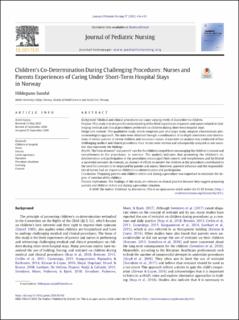Children's co-determination during challenging procedures : nurses and parents experiences of caring under short-term hospital stays in Norway
Peer reviewed, Journal article
Published version

Åpne
Permanent lenke
https://hdl.handle.net/11250/3097561Utgivelsesdato
2021Metadata
Vis full innførselSamlinger
- Artikler [412]
- Publikasjoner fra Cristin [429]
Originalversjon
Journal of Pediatric Nursing : Nursing Care of Children and Families. 2021, 57 (March–April), e34-e39. 10.1016/j.pedn.2020.09.018Sammendrag
Background: Medical and clinical procedures can cause varying levels of discomfort to children. Purpose: This study is to deepen the understanding of the lived experiences of parents and nurses related to challenging medical and clinical procedures performed on children during short-term hospital stays. Design and Methods: This qualitative study, which comprises part of a larger study, adopted a hermeneutic phenomenological approach. The data were obtained through a combination of in-depth interviews and observations of twelve parents of eleven children and seventeen nurses. A narrative re-analysis was conducted of four challenging medical and clinical procedures. Four stories were written and subsequently analyzed as one narrative that represents the findings. Results: The form of nurses' and parents' care for the children ranged from encouraging the children's consent and receptiveness to the procedures, to coercion. The analysis indicates that promoting the children's co-determination and participation in the procedures encouraged their consent and receptiveness and facilitated a successful outcome. In contrast, an absence of efforts to involve the children in the procedures contributed to the need for coercion to be employed by parents and nurses. Moreover, parental influence and the responsibilities of nurses had an impact on children's co-determination and participation. Conclusions: Preparing parents and children before and during a procedure was important to minimize the degree of coercion of the children. Practice implications: The findings of this study are relevant to clinical practice because they suggest preparing parents and children before and during a procedure situation. Keywords: children in hospital, nurse, parents, lived experience, narrative, procedure situations, coercing, consent
